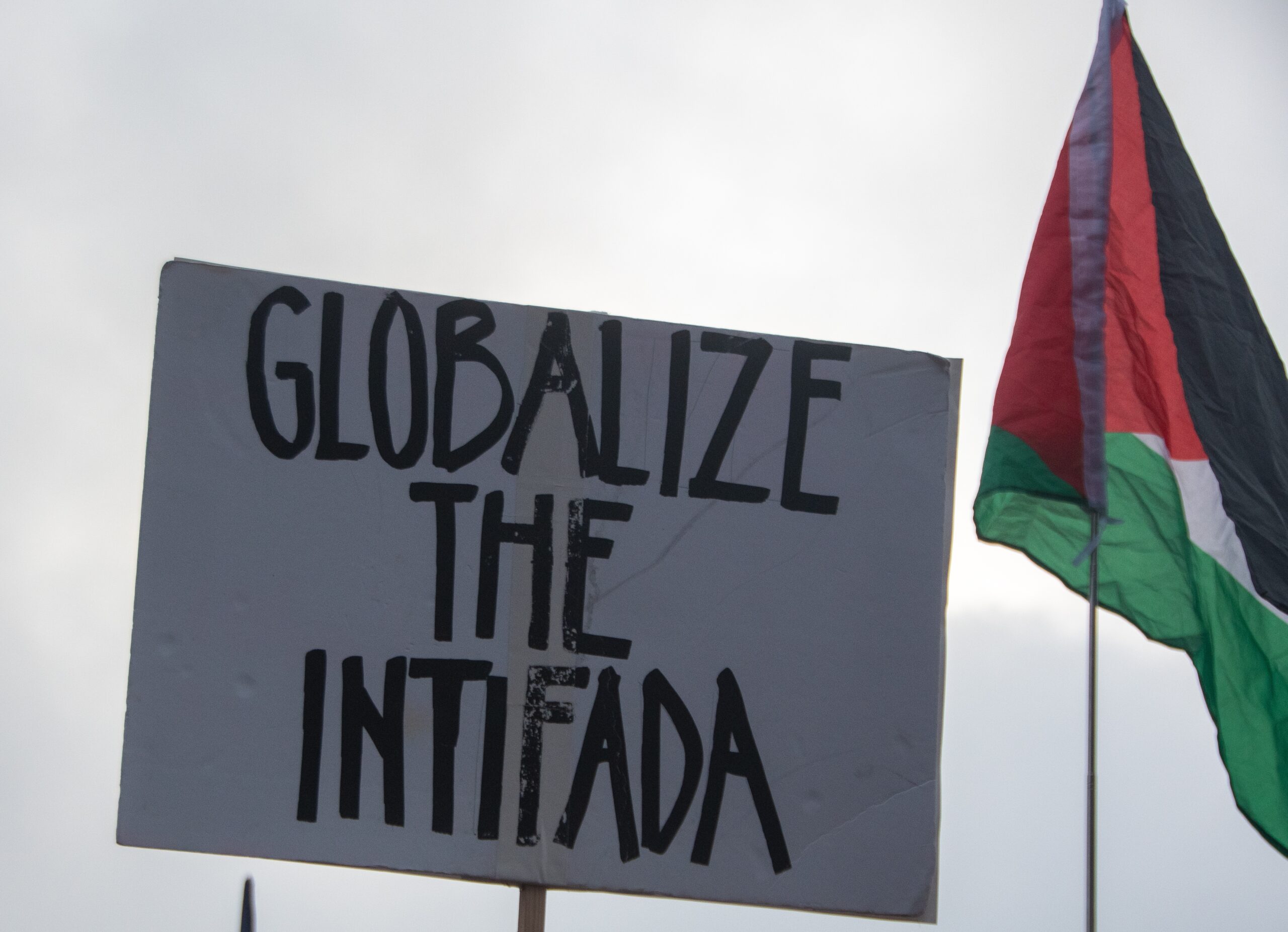On Saturday, thousands gathered in Manhattan for an anti-Israel rally that turned into one of the most brazen displays of pro-intifada rhetoric seen in the United States in years. Chants of “Globalize the Intifada” echoed across Midtown as demonstrators demanded an end to U.S. aid to Israel. For many Jews, the words felt like a chilling throwback to some of the darkest moments in modern Israeli history.
The slogan, used repeatedly throughout the rally, has become a focal point in the broader debate over whether pro-Palestinian activism is crossing the line into outright incitement. Jewish groups warn that the phrase is not merely symbolic, but a call for spreading the type of violence that defined the First and Second Intifadas.
The word intifada—Arabic for “uprising”—is not neutral. It carries the weight of bloody campaigns that specifically targeted Jewish civilians.
The First Intifada (1987–1990) included widespread riots, assaults, and Molotov cocktail attacks on Israelis, along with killings of Jews in mixed cities. The Second Intifada (2000–2005) escalated into a terror war. Suicide bombers blew up buses, cafés, nightclubs, and schools. Thousands were wounded and over a thousand Israelis were killed—many of them women, children, and teenagers. Among the most haunting attacks were the Dolphinarium disco bombing in Tel Aviv that killed 21 Jewish teens, and the Hebrew University bombing in 2002 that killed nine people, including five American students.
Speaking to the crowd, Brian Becker, director of the radical ANSWER Coalition, told the crowd that “the US government is standing with the fascist regime in Tel Aviv, but we, the American people, stand with you, the Palestinian people.”
Becker added that “they’re in Wall Street, they’re in the White House, they’re in the center of imperialism.”
For Jews, invoking the “intifada” is not abstract—it is an open call to repeat this terror on a global scale.
The American Jewish Committee (AJC) has emphasized that calls to “globalize the intifada” are inherently threatening because they glorify violence against Jews. According to the AJC, this rhetoric “normalizes the idea that attacking Jews and Israelis is not only acceptable, but necessary.” Even if demonstrators claim they do not intend violence, the phrase’s impact is unavoidably menacing to Jews, who recall how these uprisings translated into bloody massacres of civilians.
The AJC also warned that antisemitic rhetoric fuels real-world violence. The United States has seen a surge of antisemitic incidents, with the ADL reporting a 344% rise over the last five years. Chanting for a “global intifada” in New York City—home to the largest Jewish population outside Israel—intensifies fears that words will lead to attacks.
The slogan recently spilled into the city’s political scene when Zohran Mamdani, a Democratic socialist and candidate for New York City mayor, was pressed on the phrase. Initially, Mamdani argued that it symbolized Palestinian resistance and was not inherently violent. But Jewish leaders, Democratic officials, and even the business community reacted with outrage, accusing him of trivializing Jewish suffering.
Senator Kirsten Gillibrand called on Mamdani to denounce the phrase outright, insisting that New York must be represented by someone who respects all communities. Facing mounting pressure, Mamdani later pledged he would not use the slogan himself and would discourage others from invoking it. But the damage was done: many Jewish New Yorkers now view him with deep suspicion, seeing his refusal to immediately disavow the term as a troubling sign.
In Washington, Rep. Josh Gottheimer (D-NJ) introduced a resolution condemning the use of “Globalize the Intifada,” warning that it encourages violence against Jews everywhere. The resolution gained bipartisan support, with Republicans and Democrats alike insisting that rhetoric associated with terrorism cannot be normalized in American politics.
The Manhattan rally also featured other chants that are increasingly common at anti-Israel demonstrations, such as “From the river to the sea, Palestine will be free.” This phrase erases Israel’s existence entirely, calling for Palestinian sovereignty from the Jordan River to the Mediterranean Sea—that is, in place of the world’s only Jewish state.
For Jewish communities, this is not a call for coexistence but a call for ethnic cleansing. Its use is widely recognized as antisemitic, a message that the Jewish people do not deserve sovereignty anywhere.
Tragically, rhetoric has already spilled over into deadly acts. In May, Yaron Lischinsky and Sarah Milgrim, a couple and Israeli embassy aides, were fatally shot as they were leaving the Lillian & Albert Small Capital Jewish Museum in Washington, D.C., shortly after demonstrators in the city were heard chanting “From the river to the sea.” For many Jews, it is impossible to separate such words from the violence they inspire.
Jewish organizations stress that the repetition of phrases like “Globalize the Intifada” and “From the river to the sea” serves not only as political expression but also as a signal of menace. To Jewish ears, they echo a long history of antisemitic violence.
At a moment when antisemitism is surging globally—from synagogue vandalism to physical assaults on Jews in Western cities—normalizing intifada rhetoric is reckless. The slogans are not just “pro-Palestinian,” they are anti-Jewish and call into question the safety of Jews everywhere.
The events in Manhattan should serve as a wake-up call. When antisemitic slogans rooted in terrorism are shouted openly in the heart of New York, it is not just a matter of free speech—it is a matter of public safety.
History shows that words matter. The First and Second Intifadas began with rhetoric and quickly spiraled into campaigns of terror. In our own time, slogans like “Globalize the Intifada” and “From the river to the sea” have already been followed by acts of violence against Jews in the United States.
Policymakers, law enforcement, and community leaders face a stark choice: either take this rhetoric seriously and confront it, or risk allowing it to lay the groundwork for the next wave of antisemitic violence on American soil.




